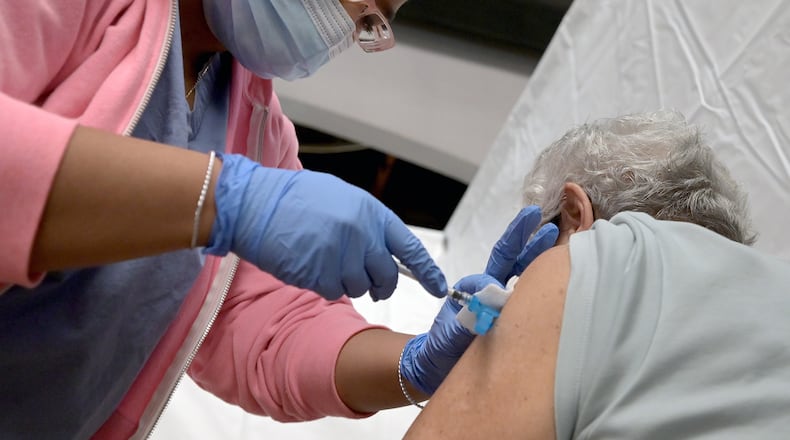The Biden administration on Wednesday announced a grant for as much as $24 million for scientists led by Emory University to research mRNA technology, the basis of the COVID-19 vaccines, for possible future use against cancer and other dangerous illnesses.
The grant appears to be the first ever awarded from a new federal fund meant to spend big, gambling for big discoveries in health.
“This is a bold endeavor that has the potential to transform the fight against cancer and other difficult diagnoses,” President Joe Biden said in a statement.
It marries two cutting edges of science: mRNA technology and using the body’s own immune system to fight cancer.
COVID-19 was the first disease fought using mRNA vaccines, and the results showed enormous advances in speed and effectiveness for the technology. The first Pfizer and Moderna vaccines were more than 90% effective at preventing infection from the original variant.
And while the COVID pandemic threw a spotlight on mRNA, researchers have long hoped to use mRNA vaccines for a very different purpose – battling cancer and other immune diseases.
The work at Emory won’t result immediately in cures or medicines, researchers involved say. However, one described the proposed research and the large “high-risk, high-reward” federal grant decision as crucial steps toward that goal.
“It’s life-changing, game-changing,” said Philip Santangelo, professor of biomedical engineering at Emory University and Georgia Tech.
Santangelo said he has become interested in the notion that an “out-of-whack” immune system plays a role in the damage from cancer and other diseases.
Credit: custom
Credit: custom
“This really enables you to confront difficult problems, put the resource towards it and make big jumps,” Santangelo said.
The money comes from a scientific research fund Congress created in 2022, the Advanced Research Projects Agency for Health, or ARPA-H. That’s a takeoff on DARPA, a well-known fund for defense-related research.
Santangelo, the principal investigator on the grant announced Wednesday, studies RNA using animal models — mice at this time.
For more than a decade, cancer researchers have been developing a type of treatment considered a personalized cancer vaccine that relies on various technologies, including mRNA and protein fragments, or peptides. The mRNA instructs a patient’s cells to produce protein fragments based on a tumor’s genetic mutations, prompting the immune system to find other cells with the mutated proteins and attack the tumor cells that remain.
Scientists have struggled for decades to create cancer vaccines, in part because they trained the immune system on proteins found on tumors and normal cells alike. Tailoring vaccines to mutated proteins found only on cancer cells can potentially provoke a stronger immune response and open new methods for treating cancer patients.
Santangelo said he and his team are working on “a really new, and very different way” of improving the body’s ability to “go and attack that tumor.”
Boosting the body’s own immune response is the key. “There are a set of cells that turn off the immune system so that the cancer can kind of continue to proliferate,” he said. “We are going after those cells and we are going to purposely attempt to prevent them from doing their job, which is to turn off the immune system.”
The grant project is a stepping stone in the research. Any resulting cancer prevention isn’t guaranteed and in any case would be years away. In a video commenting on the grant, Santangelo acknowledged the research proposal was “bold.”
Credit: Photo credit: Jack Kearse
Credit: Photo credit: Jack Kearse
This grant is to be deployed over three years, said Emory University spokesman Brian Katzowitz. Santangelo’s lab will collaborate on the work with other researchers from Emory University, as well as Yale, the University of Georgia, and Transimmune AG.
Santangelo said the program is designed to develop treatments for several illnesses and conditions, including autoimmune diseases like lupus and bacterial sepsis, a life-threatening condition that arises when the body’s response to an infection injures its tissues and organs.
In some cases, he said researchers want to induce the body to be more tolerant. “Trying to prevent transplant rejection, that’s also part of this program. And that’s when you really want the immune system to really ignore the new organ.”
While it may be possible for mRNA cancer vaccines to treat multiple people with the same kind of cancer, Santangelo said it would most likely need to be personalized to each person’s tumor.
Keep Reading
The Latest
Featured





